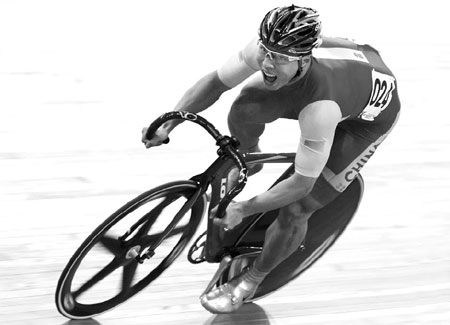Chinese sprinter Zhang Lei raced across the finish line at Beijing's Laoshan Velodrome on Sunday then took a leaf out of Jamaican sprinter Usain Bolt's book by flexing his biceps in a cavalier display of showboating by a cyclist at the top of his game.
 |
|
Zhang Lei competes in the men's sprint during the UCI Track Cycling World Cup Classics in Beijing on Sunday.??[China Daily] |
While such performances are commonplace for English Premier League strikers, NFL wide receivers and of course Bolt, they are rarely seen in Chinese society where traditional values promote modesty and humility.
As such, Zhang's display upon winning the semifinal of the men's sprint at the UCI Track Cycling World Cup Classics was perhaps a sign of things to come, and of China's growing confidence at a sport the new generation is rushing to embrace.
Zhang ultimately had to settle for silver behind France's Gregory Bauge. But just making the final of a major international competition was a new benchmark for China's men, who play second fiddle to their female compatriots in a range of sports from soccer to basketball, speed skating and tennis. Only in gymnastics do the men have a clear advantage in terms of skill and trophies.
"Women's cycling has had some good results internationally but we (men) are still seen as minnows in the sport," said Zhang, who was eliminated from the round of 16 during the Beijing Games last August but showed dramatic improvement last weekend.
"I could not hide my excitement the moment after I crossed the finish line. It was a big breakthrough for me as well as for the country. It means as long as our men's cyclists work hard and have systematic and advanced training, we can catch up with the world's best."
China failed to grab a single gold medal during the three-day tournament, which featured 17 events, but it did manage five silvers and one bronze.
"We take encouragement from this," said team manager Song Xiang. "Zhang made a significant breakthrough. Some of the new members of the squad are doing very well."
Gong Jinjie was another surprise hero for China after she came second in the 500m time trial then teamed with Zheng Lulu to capture bronze in the team sprint.
World Cup debutant Wang Cui, 19, got another silver in the women's points race, while team leader Guo Shuang did the same in the keirin.
"We have a very young team with lots of potential," Song said. "Guo is considered the veteran of the team now at 23. I'm confidant that as long as they work hard during training we will see more big things in the future."
Time will tell
Despite the epic scale of China's population, it can boast few skilled track riders compared to the big cycling powerhouses like Britain, France and Spain.
"Some of the big players in Europe have a whole group of cyclists who can beat anyone in the world, which make them very competitive, but we don't," said Song.
China has only mustered three bronze medals in the sport in the history of the Olympics, all by its women's team.
At the Beijing Games, Guo clinched medal No 3 by blasting ahead in the individual sprint. The others were won in the 500m time trial at the previous two Summer Games by Jiang Yonghua (Athens 2004) and Jiang Cuihua (Sydney 2000).
This lack of success goes some way to explain why the stands at Laoshan were empty and quiet for most of the weekend until cheering squads of middle aged women armed with thunder sticks suddenly appeared to provide a - still somewhat muted - human soundtrack to the action.
The sport's governing body has made efforts to raise the profile and skill level of cycling over the last year by sending riders abroad for training and inviting overseas coaches to China, but officials insist it is far from enough.
"Our athletes still lack opportunities to compete in big tournaments and get the kind of experience they need to succeed," said Jiang Guofeng, chief of the cycling department of at the nation's Cycling and Fencing Administrative Center.
"Guo Shuang is the best example of this. She has spent six years training at the Switzerland Cycling Training Center but she still made mistakes during the Beijing Games and this weekend's World Cup.
"What we are lacking is simple: years of international exposure," he said, adding that funding was a problem.
Jiang said that with a world-class facility at its disposal, the solution was to coax the world's best riders to Beijing by introducing big tournaments here.
"And as the hosts, of course, we would be able to submit a greater number of athletes," he said smiling.
China will host the World Cup Classic stop for the next three years.
(China Daily January 22, 2009)